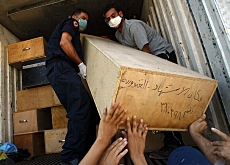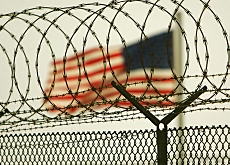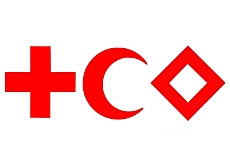ICRC hails ratification of Geneva Conventions

The Swiss-run International Committee of the Red Cross (ICRC) says the signing of the Geneva Conventions by all 194 world nations is a "historic achievement".
Philip Spoerri, the organisation’s director for international law, told swissinfo that global acceptance was an important milestone but he warned that universal application remained a distant dream.
On Monday, the ICRC announced that the last two nations – Nauru and Montenegro – had signed the 1949 Geneva Conventions. The Pacific island-state did so on June 27 and the now independent Montenegro followed suit on August 2.
The Geneva-based organisation says it is the first time in modern history that an international treaty has been signed by all states.
The four conventions and their additional protocols, of which Switzerland is the depositary state, form the backbone of international humanitarian law. They define the treatment of civilians and combatants in times of war and occupation.
But according to the ICRC, around 30 countries have yet to sign the two additional protocols of 1977, which cover the protection of victims in armed conflicts.
swissinfo: You have achieved universality with regard to the Geneva Conventions of 1949 but not the two additional protocols of 1977. Why is this?
Philip Spoerri: First of all they are considerably younger – that is one issue. Then there have been a number of states, including some major powers, which in general do not have problems with much of the treaties but disapprove of one rule or the other, which keeps them from acceding to the treaties. But if one considers the time it took to reach universality on the conventions, there’s still good hope that more states will also become party to the additional protocols.
swissinfo: The Geneva Conventions were repeatedly flouted during the conflict in Lebanon. There are clearly serious difficulties in ensuring their application.
P.S.: It is a huge success that all the countries have signed up to the Geneva Conventions and by doing so they have undertaken to respect and ensure respect for them. Unfortunately this does not prevent frequent breaches of the conventions in contemporary conflicts. I wouldn’t just point to Lebanon.
One of the weaknesses of these conventions is the lack of enforcing mechanisms. Of course we have institutions that have been created over the past decade, like the International Criminal Court, which do create hope that the implementation of international humanitarian law is strengthened, but this is a slow process. However I would argue that if one did not have these rules, the situation would be a lot worse.
swissinfo: You now have universal acceptance. Do you think we will ever reach the point where we have universal application?
P.S.: This is a very lofty idea to think that if wars break out everybody will abide completely by the book. One can only dream of that. But what one can hope for is that more effort is put into military training and into punishing those responsible for breaches of the conventions. I think that this is more realistic.
swissinfo: Do you feel that Switzerland, which is the depositary of the Geneva Conventions, should be playing a more active role in ensuring that they are applied?
P.S.: It’s really not for me to make any statement on Swiss foreign policy. The depositary, as such, does not have any obligation to play a particular role. If the state wished to do so because of its proximity [to the conventions] that is its choice and Switzerland is very free to decide how active it wants to be internationally in seeking greater respect for these conventions.
swissinfo: The United States is still denying the ICRC access to prisoners held in secret locations. If the world’s superpower is not abiding by the rules, what kind of message does this send out to other states?
P.C.: The ICRC seeks access to all persons arrested in relation to armed conflicts. The ICRC has generally had good access to detainees held by the United States in Afghanistan, Iraq and Guantanamo. It is however also a fact that the ICRC has so far not been able to access a number of detainees. Access to detainees without any exception is our aspiration – and this is the message sent out to other states.
swissinfo-interview: Adam Beaumont in Geneva
Henry Dunant, founder of the Swiss-run International Committee of the Red Cross, initiated the first convention. It was adopted in Geneva on August 22, 1864.
The four conventions were revised and extended in 1949 to cover armed forces on land and sea, prisoners of war and civilians.
Two additional protocols covering the protection of victims in international and non-international armed conflicts were adopted in 1977.
A third additional protocol relating to the adoption of a third humanitarian symbol – the red crystal – was approved in June this year.

In compliance with the JTI standards
More: SWI swissinfo.ch certified by the Journalism Trust Initiative










You can find an overview of ongoing debates with our journalists here . Please join us!
If you want to start a conversation about a topic raised in this article or want to report factual errors, email us at english@swissinfo.ch.